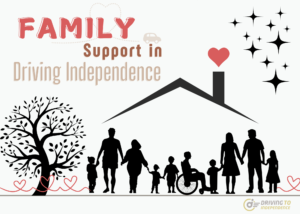
As we recognize National Family Caregivers Month, it’s essential to highlight the pivotal role families play in supporting their loved ones on the journey to driving independence. For individuals with disabilities, having a strong support system can significantly impact their ability to drive confidently and safely. This blog will explore how families can provide encouragement, practical assistance, and advocacy as their loved ones navigate the road to independence.
The Role of Family in Driving Independence
Encouragement and Emotional Support
- Emotional support is crucial for individuals learning to drive or adapting to driving after an injury. Family encouragement can bolster confidence, making the process less intimidating. For example, a family member can accompany their loved one to driving lessons, offering reassurance and celebrating small milestones together.
- Testimonials from individuals who received support from family members often highlight the importance of having someone believe in their ability to succeed. This support can help alleviate anxiety and foster a positive mindset.
Practical Assistance
Families can assist in various practical ways, such as:
- Attending Driving Lessons: Being present during lessons can provide comfort and allow family members to understand the specific needs and challenges their loved one faces.
- Researching Vehicle Modifications: Families can help find adaptive technologies that cater to the individual’s requirements, such as hand controls or modified seating.
- Practicing Driving Skills: Family members can create a safe environment for practice, such as driving in low-traffic areas, allowing their loved one to gain confidence behind the wheel.
Specific Challenges and Solutions
Managing Transportation Logistics: Caregivers often face the challenge of coordinating rides and scheduling practice sessions for their loved ones. This can involve balancing personal schedules, understanding transportation resources, and ensuring that the individual has access to necessary vehicles. Utilizing apps for scheduling or ride-sharing services tailored for individuals with disabilities can alleviate some of these logistical burdens.
Dealing with Emotional Setbacks: Anxiety and fear related to driving can be common challenges for individuals with disabilities. Families can play a crucial role in helping loved ones navigate these emotional hurdles. Strategies might include:
- Open Communication: Encourage discussions about fears and anxieties, fostering an environment where individuals feel comfortable sharing their concerns.
- Positive Reinforcement: Celebrate small achievements and milestones in the driving journey, reinforcing confidence and motivation.
- Professional Support: Seeking help from driving rehabilitation specialists can provide targeted strategies to address specific anxieties and improve driving skills.
Advocacy
Family members often serve as advocates for their loved ones, navigating the complexities of healthcare, educational systems, and driving regulations. This advocacy includes:
- Understanding Rights: Families can educate themselves on the legal rights of individuals with disabilities, ensuring their loved ones receive necessary accommodations.
- Engaging with Professionals: Connecting with healthcare providers, driving rehabilitation specialists, and disability services can help families access essential resources for their loved ones.
Building a Supportive Environment
To foster a supportive environment, families can implement several strategies:
- Set Realistic Goals: Encourage your loved one to set achievable driving goals and celebrate progress, no matter how small.
- Open Communication: Maintain an ongoing dialogue about any fears or challenges encountered during the driving process. This can help families address concerns together.
- Encourage Participation in Support Groups: Connecting with others facing similar challenges can provide emotional support and practical advice. This connection can empower individuals as they share experiences and strategies.
Resources for Families
Several organizations and resources are available to support families and individuals with disabilities on their journey to driving independence:
- Driving to Independence: This organization specializes in driver rehabilitation and training services tailored to individuals with disabilities, providing personalized assessments and support. (Driving to Independence)
- Association for Driver Rehabilitation Specialists (ADED): ADED offers resources and information for individuals with disabilities seeking to enhance their driving skills. They provide a directory of certified specialists who can assist in the process. (Association for Driver Rehabilitation Specialists (ADED))
- National Highway Traffic Safety Administration (NHTSA): The NHTSA provides resources for safe driving and understanding the rights of drivers with disabilities. (National Highway Traffic Safety Administration (NHTSA))
- Family Caregiver Alliance: This organization offers resources and support for family caregivers, including information on managing caregiving responsibilities and finding community services. (Family Caregiver Alliance)
Conclusion
As we honor National Family Caregivers Month, let us recognize and appreciate the essential role families play in supporting their loved ones on the journey to driving independence. Their encouragement, practical assistance, and advocacy are invaluable in fostering confidence and ensuring safety on the road. At Driving to Independence, we are committed to supporting both individuals with disabilities and their families as they navigate the path to independence. Together, we can empower individuals to embrace the freedom and confidence that driving provides.
